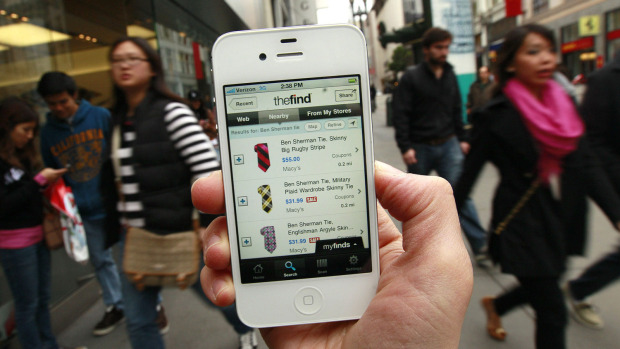Description: In the past few years, companies have amassed trillions of digital bread crumbs: from credit card transactions, from people’s online wanderings on social media and search sites, from GPS devices embedded within smart phones.
Source: theglobeandmail.com
Date: Jan 6, 2012

The Christmas season may still be a recent memory, but many marketers are already casting a hopeful eye upon 2012 as the year they finally turn into mercantile versions of Santa Claus: omniscient beings who know everything about their customers, and not just whether they’ve been bad or good. (And yes, the marketers believe they’re doing it for goodness’ sake.) Read rest of story
Questions for discussion:
- What are the privacy concerns raised by this story?
- Is this large collection of data a positive or negative development for the consumer?


Paige
the concerns are for consumer privacy and marketing ethics. i have no doubt that there are many wonderful things that can come from understanding what people feel, buy and like/dislike but is this information best served by marketers? on the other end, the notion that only ‘big data’ has access to this information is bogus and that brings into consideration a persons right to privacy in terms of what they buy, where they go and what they search on the internet. obviously this information has its uses in rooting out and solving crimes but do the ends justify the means? i don’t personally believe it does. in terms of providing consumers with more personally-tailored goods and services it may be good, but in terms of consumer privacy and the right to make free decisions without manipulation is also a plus.
Lacey Dodds
The privacy concerns raised by this story relate to the monitoring of people’s interests and habits without their upfront consent. Some sites you can see it is evident, such as on facebook, the side of page is sometimes filled with “people you may know” or “pages you may like” but I think that things such as spending habits, and websites visited should not be recorded. I think that this large collection of data may be positive for some and negative for others. For the people that are extremely busy and do not have time to research what product or service they want, it might be positive that these marketing companies already know what they want and can deliver that to them. For me and many others, however, I like to take the time to research things I am interested in and make my own decision as to whether I want to buy it or not. I do not need a company exploiting my privacy, then using that information to tell me what they think I should buy. I am totally against this idea of information storage; I value my privacy.
Jeanine van Nierop
There are a lot of privacy concerns raised by this story. First, the fact that someone out there knows everything about you, including what you buy, when you buy it, why you buy it..It is a scary thought. Second, how do we know that the information that is used about us is actually used for the purposes that is stated.
I do not think that this collection of data is good for the consumer. What happened to privacy? I don’t think that if a company knew that I was not buying their product that they would do anything about it, so what’s the point?
Carlin
Privacy concerns exist because people’s habits and actions are being analyzed without them explicitly agreeing to it, and explicit agreement for these types of things has always been sought in the past, whereas now implicit agreement is more common. It may be because I’m younger and from Gen Y, but I don’t see what the problem is with this. Companies are not using this information to bust down your front door or take away your rights and freedoms. I find that the backlash against “Big Data” mostly comes from older people who are nostalgic about the way things used to be and are (understandably) feeling a little alienated as the world is rapidly changing. The fact is, “Big Data” is simply used by comapnies to increase their bottom line, and what consumers get out of it is more personalized advertisment. This is only viewed as a bad thing by people who are convinced that being analyzed is something malevolent.
It comes down to individual choice. Everyone who is using Facebook is making the choice to have more of their information available to the world. The information age has created a situation in which individuals have to better educate themselves about how they are broadcasting themselves.
Ford
The privacy concerns are that any company will have access to your personal information such as, name address, phone number, possibly credit card, SIN and so on. I am sure that there is some sort of claim that no one will release your info without your permission and so on but in the end if you don’t want your info out there, then don’t give it up. If you do want to be able to know when the best time is to fertilize your crops then go ahead give up some info so that you in the end can be benefitted. I think that this idea could either end up being a great idea or one that crashes and burns and puts a lot of people at risk.
Tim Anderson
“a complete view of the customer” – one of the goals of all this data gathering and analysis. However, behind the data lies power and control. This is what is at stake in the years to come. Our generation is being controlled not by the force of ‘guns’ but through subtle manipulation of our want and desire for the ‘stuff’ that makes us feel secure and happy (and preoccupied).
Ashley O'Donnell
The privacy concerns raised by this story are the fact that a consumer cannot purchase or virtually do anything without our behaviour being converted into data for some company. This is a concern because every time we do purchase and our information is stored somewhere, we have not given permission for them to obtain or keep our information. Even if we do give our permissible personal information to companies, there is no guarantee that this personal information will be kept safe. There are always hackers out there, breaking into companies information storage and stealing individuals personal identity.
I believe the large collection of data is negative development for the consumer. While it is important to know who is buying your product and who should be marketed to, the type of information companies collect is unnecessary. A company does not need to have our credit card number of file to learn about its consumer. It is time companies come up with a new strategy to learn about its consumers without collecting such personal information for its customers. They are hurting themselves by putting our identity at risk for criminals to steal. It is hard enough keeping our identity protected without companies making it even tougher.
Sagrika
There are obviously major privacy concerns because the data is being used without our consent. Internet business is not concerned about the consumers but is focusing on their profits and how much data they possess. They have been using consumers and exploiting their privacy for their own means especially the things such SIN number, credit card numbers which concerns me. Also because of big data, can’t tell the customer relationship anymore. The trust and the loyalty between the consumer and its market would not exist anymore if this continues to take place. This might help the consumers in the long run such as getting the deals and the discounts but at the cost of such delicate private data, I am sure they would be willing to reject that if they were aware of this situation . This is the reason I think that the collection of such large data is initiating the negative development of consumers.
Rachael Brown
The title of this article “Big Data is watching you” is reflective of the omniscient nature of database storage. In the past few years, companies have been storing mass amount of data from credit card transactions, online interaction, etc. The data collected can be used to specifically tailor ads to the consumer’s interests. For example, Facebook targets specific consumers based on their “likes” and “interests” to enhance marketing results. Many online users are concerned about their personal privacy, and how the information collected is used. In fact, online users have little to no control on how their personal information is distributed without boycotting online interaction altogether.
By collecting and storing information about the consumer companies hope to more effectively and efficiently target specific consumer segments. Arguably, companies claim that “big data” is used to better serve the customer in a variety of ways. For example, a company can use this data to supply customer discounts or provide customers with useful informative data. In addition, companies can create more meaningful relationships with clients by being more in tune to their wants and needs. In contrast, this customer information may be exploited for a large variety of reasons. Many users do not read privacy policies, and are all together unaware of how their data is being used. However, It is up to the consumer to be knowledgeable about what type of information he or she shares in an online and real life environment.